A correctly working cooling fan is essential to keeping engine temperatures down and the engine performance up. When a cooling fan or its supporting components fail, the first issue people notice is the cooling fan noise. With that in mind, it brings questions such as why it is sometimes so loud that you can hear it above the engine noise and what caused it.
To begin with, a loud cooling fan doesn’t necessarily mean there is an issue. If you are unfamiliar with the vehicle, some cars have louder cooling fans than others. Some vehicles run hot, so you rarely hear the cooling fan because it never kicks in, so it may shock you to hear it working. But on the other hand, there are many reasons for the fan to get louder than ever, which indicates an issue. This article explains many common causes I have found over the years when a car has a noisy cooling fan.
What Does the Radiator Fan Do?
The radiator cooling fan reduces engine temperatures by forcing air through fins in the radiator core with coolant passing through them. The air moved by the fan cools the coolant. The colder coolant is then pushed back around the engine, reducing temperatures.
Car cooling fans also have a secondary job, which most people forget about, of removing the hot air from the engine bay, also aiding in stopping engine temperatures from rising.
Although an engine fan can operate any time the engine reaches its switch on temperature, it only affects the cooling when the car travels 50kph (30mph) or less. When driving above 50kph, the air passing through the radiator is far greater than a cooling fan can provide. When the vehicle travels below 50kph, the engine temperatures will naturally rise as there isn’t enough air passing through the radiator to keep the car cool; this is where the cooling fan comes in to assist.
8 Reasons Why Your Cooling Fan Is Loud
- Worn fan internals – Inside an electric cooling fan is a motor with bearings, bushes, and a center spindle. These can fail anytime, creating excessive noise, intermittent fan operation, and reduced cooling performance. Even though fans are usually IP-rated with age, water or debris can work its way in and cause an issue. A failed motor is the problem I see the most, and I’ll often take the fan apart to see evidence of water in the motor.
- Blocked radiator – The radiator core can become blocked by bent cooling fins, dirt, trash, and even a carrier bag. When the core is blocked, the engine temperature increases as no air passes through, meaning the fan is sent into overdrive trying to keep up. The other thing that happens is the air is not pushed/pulled through the radiator core, which increases the fan’s working pressure, creating additional noise and reducing cooling performance.
- Worn fan belt – The fan or auxiliary belt is constructed of rubber and a Kevlar-type material. The belt becomes dry, stretches, and cracks with age, meaning it no longer sits tight on the pulleys. When this happens, the belt jumps on the pulley and screeches. This a horrible loud noise. Sometimes readjusting the belt if it has a tensioner can irradicate the issue.
- Distorted electric fan housing – This usually happens under the installation of an aftermarket fan. But if the fan is installed with the fan shroud slightly compressed (forced to fit brackets), it gets bolted together, and the blades become distorted in the shroud, meaning they catch the inner shroud. When the fan starts up, the blade’s tips scratch on the shroud, creating a lot of noise. It is essential to note this may not happen immediately after installing the fan but a few thousand kilometers after. This is because the rise in temperatures from the fan motor under stress changes the fan shroud’s shape, but this doesn’t happen overnight.
- Broken fan shroud – A viscous fan sometimes has a large plastic shroud to direct the airflow. You’ll hear if the fan shroud becomes broken or has a hole. Either the shroud catches on the engine-driven fan as it rotates, or you hear a whistling noise from the air escaping through a hole.
- Overheating engine – When an engine overheats at idle or low speeds, the fans try to keep it cool. If the motor is overheating, the fan(s) will operate constantly, making the fan noise evident. It won’t be a problem with the fans, but a sensor such as a faulty ECT sensor causes the fans to kick in constantly.
- Worn pulley – The fan belt pulleys wear out; although not common, they can become seized or wobble. Any distortion or irregularity in the pulley will cause squeaking noises; sometimes, the fan is blamed when it is not the fan but the pulley.
- Failing viscous fan clutch – The fan clutch engages the fan when required. The fan clutch can fail and fully engage the fan all the time. A fully engaged viscous fan will be loud, and it will also reduce engine performance.
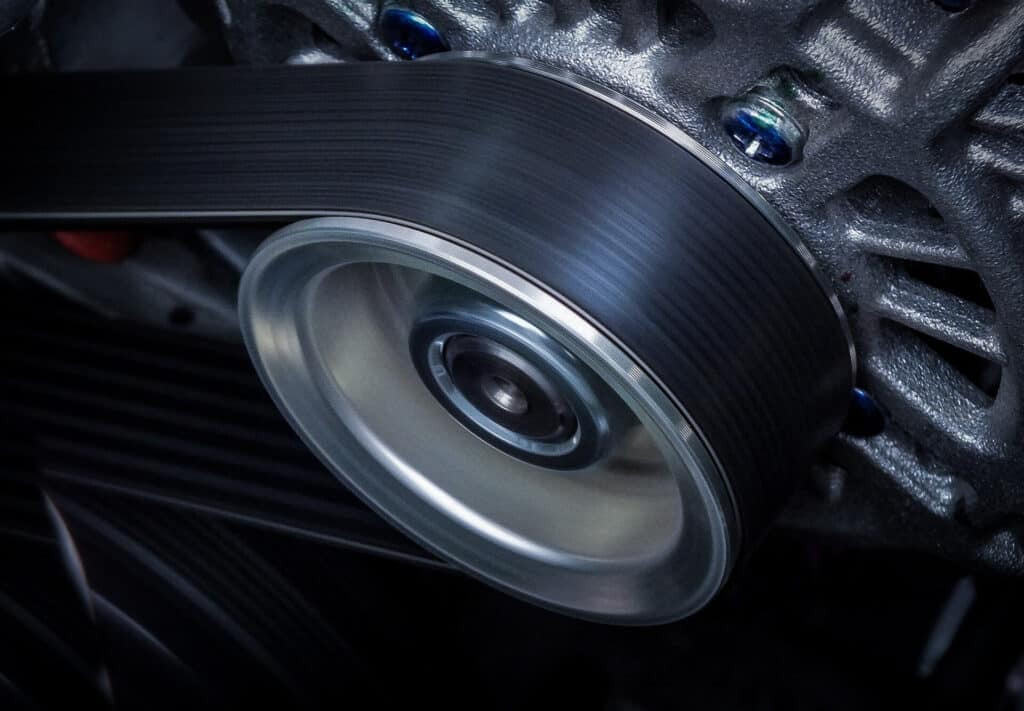
How Loud Should a Car Cooling Fan Be?
Regardless of the type of cooling fan, viscous, mechanical, or electrical, they should be heard when running. The reason is to move enough air to keep the engine cool; the trade-off is the noise the blades generate when pulling/pushing the air through a radiator. To be clear, you should only be able to hear the fan moving air; you shouldn’t hear unusual noises such as squeaking or screeching.
To judge if the fan is too loud, you should be able to have a conversation without raising your voice while standing next to the car with the fan operating. If you can only hear the cooling fan above the engine, you should check for any obstructions and ensure nothing is catching the rotating fan blades. If the fan fails, the engine temperatures will rise rapidly, so if you are unsure, having your mechanic take a look would be best.
Why Is the Radiator Fan Loud When the AC Is On?
Some vehicles have a separate AC fan, so with the AC on, you have the noise of both fans operating simultaneously, thus amplifying the fan noise.
The AC needs either an auxiliary or the main cooling fan working when it is on to push air through the condenser; the condenser is a secondary radiator that needs air flowing through it to exchange the heat and keep cool AC air pumping. Either of two things is happening if you believe the noise is excessive: the noise has only just become apparent to you because you don’t use the AC that often, or the AC fan is failing in the same way as an engine cooling fan can, as per the list above.
How Do I Reduce the Fan Noise in My Car?
To reduce fan noise is not that simple, and vehicle/fan depending, there may not be anything you can do. First, you must make sure there are no blockages in the radiator core, the blades are clean, spin freely, and there are no other issues (possibly, even confirmed by your mechanic).
Next, you must check that there are no holes in the bulkhead (metal wall between the engine bay and the cabin). Pipework and electricals pass through the bulkhead through rubber grommets and seals, which act as sound deadening. The grommets and seals can sometimes get dislodged, amplifying engine bay noises like the cooling fan when sitting in the cabin. If you can’t reseat or replace the dislodged grommets, use some high-temperature expanding sealant to fill the holes.
If the above doesn’t highlight an obvious issue, you may need to take the vehicle to a mechanic to confirm what is causing the loud fan noise. If you have an aftermarket upgraded fan fitted, you may need to consider having a larger fan fitted running at a lower speed but again you should speak with a specialist before considering this.
Frequently Asked Questions
Are Noisy Fans Bad?
Unless there’s a problem, a noisier fan usually indicates that it is shifting large quantities of air. Depending on the circumstance, this may not be an issue.
What Does A Bad Fan Motor Sound Like?
You will not hear a specific issue when you have a bad fan motor because the motor will usually fail and stop spinning. However, if the fan is still spinning with a failed motor, you may hear a loud rumbling sound.
How Long Will A Car Cooling Fan Last?
Electric cooling fans are built with a standard motor life expectancy of around 5,000 hours. Remember, the fan isn’t always working and will usually operate for a couple of minutes at a time when it does. Realistically, you can expect a car cooling fan to last 10 + years.
Final Thoughts
Radiator cooling fans can be noisy, but they should never be excessive or unusual noises. If you find your cooling fan excessively noisy, the fan’s internal motor failure is the most common cause, but you might be lucky, and it could be debris blocking the radiator core. It’s not unheard of for something as silly as a plastic bag wrapped around the fan, especially on viscous (engine-driven) fans.
If your radiator fan is a bit louder than usual, consider having your mechanic take a look. Although driving may be completely safe if the car is not overheating, it could indicate another issue.

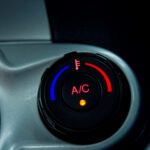




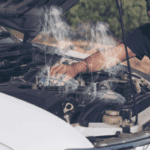
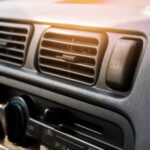

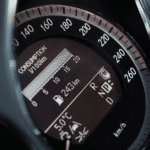
my trucks ac cooling fans come on very load and high speeds but only when it is very hot outside ,even on cold starts, I have replaced the thermostat and the coolant temperature sensor along with the coolant . I dont want to take it to the dealership where they will charge me $180 just to tell me that its normal because its not. if ac is off there are no high speeds on the fans.
Thanks for your comment. The AC cooling fan works in an entirely different way to the engine cooling fan and doesn’t operate from coolant, engine temperatures or ECT. The AC fan should only operate when the AC is on and the compressor is working, if you start your truck with AC off or even once the engine is running switch off the AC, the fan should stop. If it doesn’t it may be just a simple relay or switch for the AC fan. This might sound a silly question but does the AC work? As in is it blowing out cold air when on?